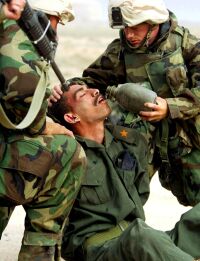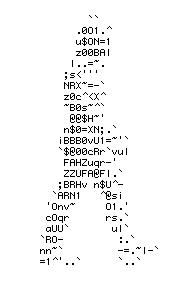Kommentar bei CBS: "Commentary: Net makes truth a casualty of war".
Truth already a casualty
Commentary: Before the bullets, come the rumors
By David Callaway, CBS.MarketWatch.com
Last Update: 12:05 AM ET March 20, 2003
SAN FRANCISCO (CBS.MW) - They say that the first casualty of war is truth. In the Internet age, it's the first 10 casualties.
Even before President Bush announced the start of military operations against Iraq, rumors were already flying fast and furiously around the Internet and other media, an ominous sign of inaccurate reporting to come.
Iraqi Deputy Prime Minister Tariq Aziz shot while trying to flee the country; U.S. troops already crossing into the demilitarized zone between Iraq and Kuwait; a battle at sea already begun; U.S. airlines to be grounded when the fighting starts. All rumors breathlessly reported over the Internet and quickly picked up and blasted across television, radio, and even some newspapers.
Granted, nobody wants to wait for government confirmation of battles or victories. And certainly no one trusts official figures and status reports given by buttoned up military press agents.
But the speed of the Internet makes the false rumors and inaccurate reports that any war generates more dangerous than ever. They instantly become accepted wisdom, raising the tension of an already nervous world and moving markets.
Trusted by the public to confirm facts before running stories, the media will be under pressure like never before in this war to justify the immense cost of covering the campaign by getting the most scoops and the quickest analysis.
The result will be several volatile days for news organizations and readers alike as we try to digest confusing reports about whether Saddam is dead or has fled, whether chemical weapons are being used, or when and how our troops will enter Baghdad.
The final hours of waiting for President Bush to announce the beginning of the campaign on Wednesday reminded me a bit of the first few hours after the 9/11 attacks, when reports of damage and other attacks flooded the Web and the airways.
Rumors that Camp David had been bombed or that four more hijacked jets were heading to the West Coast were reported all over the place as fact, raising the fears of a shocked U.S. population. The campaign in Afghanistan was no different, as the hunt for Taliban leader Mullah Omar and Osama bin Laden generated a daily diet of bad information about whether they had been killed or captured.
As the Iraqi campaign begins, the lesson for journalists and readers alike is to be cautious about buying into everything you hear or read.
The uneasiness of the world about this war will be measured by the markets, with the dollar, the Dow ($INDU: news, chart, profile), gold and crude oil all expected to fluctuate wildly as the battle intensifies. Crude oil fell below $30 a barrel Wednesday for the first time in two months. The dollar has been rallying. The Dow is up 850 points in the last week, including its first six-day surge in two years.
But at any given time, on any given news item, all of that could change. We just don't know.
The time for debate about war has ended. Like it or not, the time for action has begun. As America prays for the safety of our troops and the Iraqi people, the media bears a responsibility now more than ever not to sensationalize events or run with shaky reports.
It's a tall order. But in war, there's no other kind.
David Callaway is executive editor of CBS.MarketWatch.com.
CBS MarketWatch:
http://cbs.marketwatch.com/news/default.asp?siteid=mktw
OJC: Commentary: The Net will play key role in Iraq war (March 10, 2003):
http://www.ojr.org/ojc/topics/brief.php?briefID=49744




















